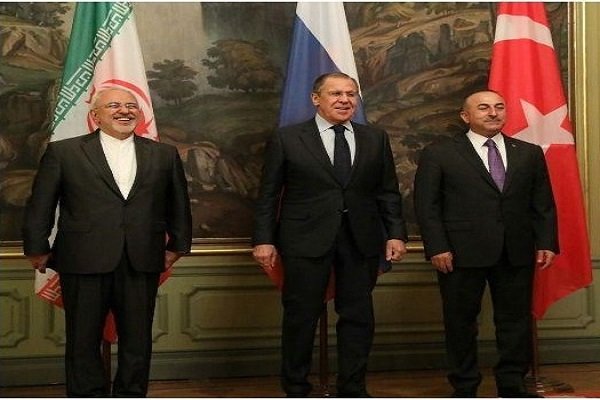
Diplomats hope for peace in Syria within Astana Process, UNSC resolution

The three Foreign Ministers, Iran’s Mohammad Javad Zarif, Russia’s Sergei Lavrov and Turkey’s Mevlüt Çavuşoğlu, attending the Moscow meeting on Syria and Astana Peace Process, issued a joint statement at the end of their meeting on Saturday.
This is the second meeting of guarantor states’ foreign ministers in Moscow where they discussed developments in Syria and neighboring regions, and the effects of these developments on peace and security in the region.
They underlined their commitment to Syria’s independence, unity, territorial integrity and sovereignty within the framework of the UN charter and called all countries of the world to respect the law.
They also reiterated their determination for bolstering trilateral cooperation based on issued joint statements by the presidents of the three countries of the Islamic Republic of Iran, the Russian Federation and Turkey on November 22, 2017 and April 4, 2018.
They agreed to continue their joint efforts to facilitate reaching a stable political settlement in Syria based on benefiting from the perspective drafted in resolution 2254 of the UNSC and the mechanisms defined in the multi-layered format of Astana Peace Process.
Here comes the full text of the joint statement in 12 articles:
The Ministers of Foreign Affairs of the Islamic Republic of Iran, the Russian Federation and the Republic of Turkey, as guarantors of the observance of the ceasefire regime in Syria, held the second meeting in Moscow on 28 April 2018. They discussed the development of the situation in and around Syria and its impact on the regional peace and security.
The Ministers:
1. Reaffirmed their strong commitment to the sovereignty, independence, unity and territorial integrity of the Syrian Arab Republic, as well as to the purposes and principles of the UN Charter and highlighted that these principles should be respected by all.
2. Emphasized their determination to strengthen trilateral coordination on the basis of the joint statements by the Presidents of the Islamic Republic of Iran, the Russian Federation and the Republic of Turkey of 22 November 2017 and 4 April 2018.
3. Agreed to increase joint efforts aimed at facilitating the achievement of a lasting political settlement in Syria envisaged by the UN Security Council resolution 2254 and through full use of multi-level mechanisms of the Astana format.
4. Underscored the efficiency of the Astana format as the only international initiative that had helped practically improve the situation in Syria through joint efforts to combat terrorism, reduce the level of violence and create favourable conditions for the political settlement, including via facilitating broad intra-Syrian dialogue. Decided to hold the next International Meeting on Syria in Astana in May 2018 in conjunction with the second meeting of the Working Group on the release of detainees/abductees and handover of the bodies as well as the identification of missing persons.
5. Emphasized the importance of the contribution of Astana format to ensure real progress in achieving a political solution in Syria through an inclusive, free, fair and transparent Syrian-led and Syrian-owned process based on the free will of the Syrian people and leading to a constitution enjoying the support of the Syrian people, and free and fair elections with the participation of all eligible Syrians under appropriate UN supervision. In this regard agreed to increase the frequency of regular joint consultations of high-level representatives of the Islamic Republic of Iran, the Russian Federation and the Republic of Turkey with the United Nations Secretary-General and his Special Envoy for Syria in order to facilitate the beginning of the Constitutional Committee`s work in Geneva as soon as possible on the basis of the recommendations of the Congress of the Syrian National Dialogue in Sochi and in coordination with the three guarantor-states.
6. Reaffirmed their determination to continue their cooperation in order to ultimately eliminate DAESH/ISIL, Nusra Front and all other individuals, groups, undertakings and entities associated with Al-Qaeda or DAESH/ISIL as designated by the UN Security Council in Syria and underscored the success of their collective efforts in the fight against terrorism. They called upon all armed opposition groups in Syria to completely and immediately dissociate from above‑mentioned terrorist groups.
7. Highlighted the importance of de-escalation efforts and reiterated their commitment to preserve the ceasefire regime that had become instrumental in helping to reduce violence on the ground and alleviate the humanitarian suffering.
8. Rejected all attempts to create new realities on the ground under the pretext of combating terrorism and expressed their determination to stand against separatist agendas aimed at undermining the sovereignty and territorial integrity of Syria as well as the national security of neighboring countries.
9. Strongly condemned any use of chemical weapons in Syria and demanded that any reports in this regard be investigated promptly and professionally in full compliance with the Convention on the Prohibition of the Development, Production, Stockpiling and Use of Chemical Weapons and on Their Destruction and by the OPCW as the main international competent authority to establish use of chemical weapons.
10. Reaffirmed their commitment to continue joint efforts aimed at protecting the civilians, improving the humanitarian situation via facilitating rapid, safe and unhindered humanitarian access to all those in need, launching and maintaining work of confidence building mechanisms between the parties as well as helping normalize the situation all across Syria, including by creating conditions for safe return of refugees and internally displaced persons.
11. Called upon the international community, first and foremost the UN and its humanitarian agencies, to increase their assistance to Syria in the interest of all Syrians, including by facilitating humanitarian mine action, restoring basic infrastructure together with social and economic facilities, and preserving historical heritage.
Source:Mehrnews















